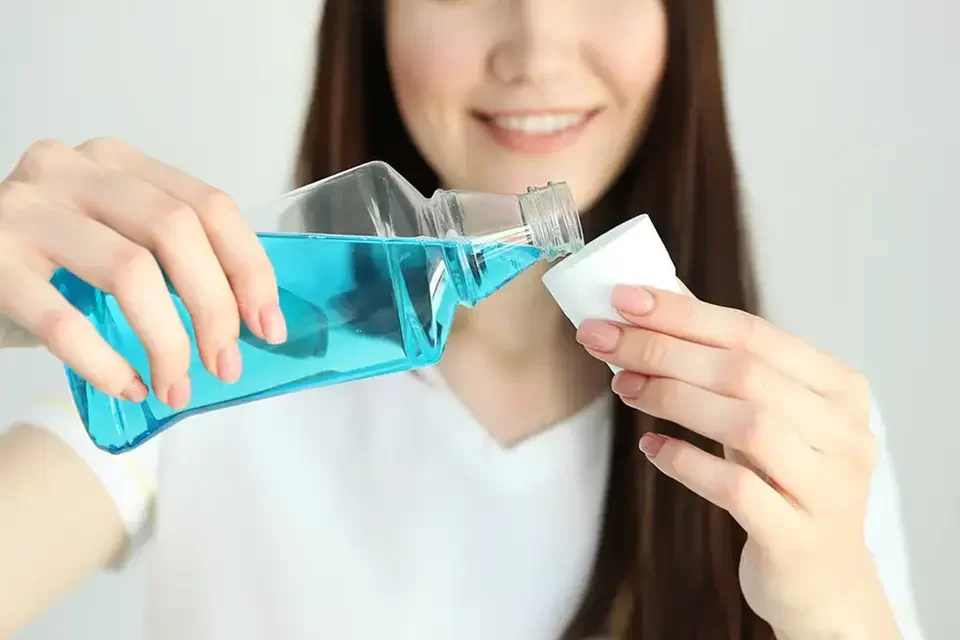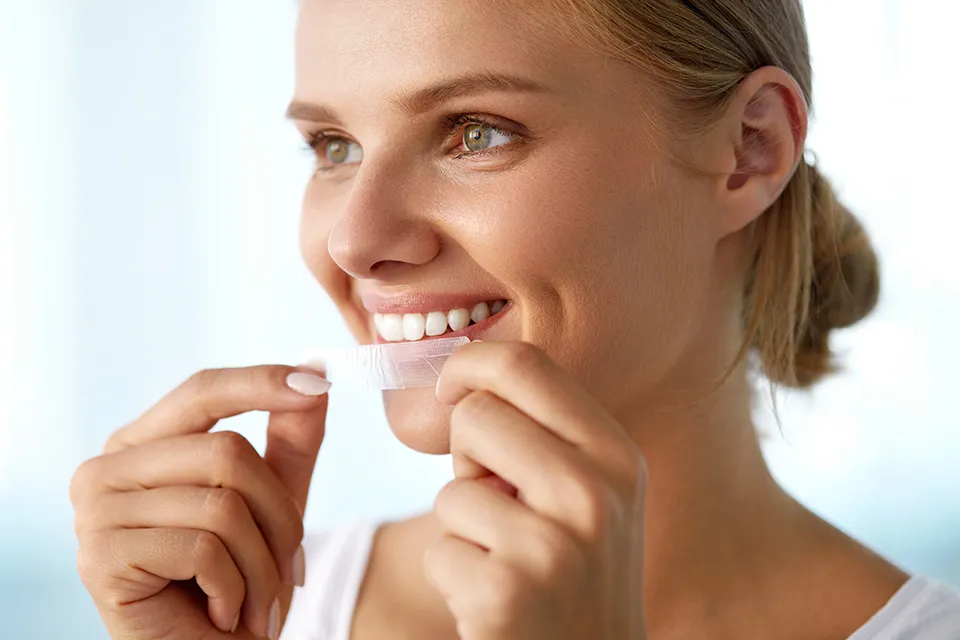Hydrogen peroxide (H₂O₂) is a highly effective bleaching agent. It is widely used for its antiseptic effects, but it is also the main ingredient in many teeth whitening solutions, where it breaks down stains for a brighter, whiter smile.
Hydrogen peroxide, which has a pale blue liquid appearance, is well known for its reactive properties. When applied to teeth, it breaks down into water and oxygen, with the latter oxidizing stain molecules effectively eliminating discolouration from the tooth’s surface.
Hydrogen peroxide is, in fact, an effective teeth whitener. Scientific research has consistently proven that hydrogen peroxide may considerably lighten the colour of teeth. Moreover, this provides a non-invasive way to improve the aesthetic appeal of your smile.
Is it Safe to Use Hydrogen Peroxide to Whiten Teeth?
Hydrogen peroxide is safe for dental use within specific concentrations and application methods. Its safety and effectiveness make it a popular choice for both over-the-counter and professional teeth whitening procedures.
As a mild antiseptic, hydrogen peroxide is used not only for whitening teeth but also for wound cleaning, indicating its safety for oral use when properly diluted.
Hydrogen peroxide can be applied in various forms, including gels, strips, and mouthwashes. Adhering to the instructions for at-home treatments is of the utmost importance in order to prevent potential irritation or overuse.
The most frequent techniques involve utilizing pre-filled trays and applying strips directly to the teeth. They also involve rinsing with a mouthwash containing hydrogen peroxide.
Over-the-counter products typically contain 3-10% hydrogen peroxide, while professional treatments can go up to 35%. The higher the concentration, the more effective, but also increased the risk of potential side effects. This highlights the significance of seeking professional advice.
What Is the Safe Level of Hydrogen Peroxide for Teeth Whitening?
The safe concentration of hydrogen peroxide for teeth whitening varies based on the method and duration of treatment. Generally, products with up to 10% hydrogen peroxide are considered safe for at-home use. However, professional treatments may use higher concentrations under careful supervision.
What Are the Various Methods for Applying Hydrogen Peroxide for Teeth Whitening?
From whitening strips to gel-filled trays and whitening pens, the methods for applying hydrogen peroxide are diverse, allowing individuals to choose the best option for their lifestyle and whitening goals.
How Long Should a Typical Hydrogen Peroxide Teeth Whitening Treatment Last
A typical treatment might last from a week to a month, depending on the product concentration and desired whitening intensity. Although professional treatments may produce results quickly, they necessitate dental supervision.
Is Hydrogen Peroxide Good for the Teeth?
Hydrogen peroxide is one of the most popular teeth whitening treatments since it is highly effective at removing both surface stains and deeper discolouration.
Although results can differ, the majority of users notice an improvement within a few days to weeks of consistent use; for optimal results, wait until the completion of a complete treatment cycle.
When compared to other professional dental whitening treatments, hydrogen peroxide-based products are frequently a less expensive option with comparable outcomes.
These whitening treatments are widely available in stores and online, making them a convenient option for people wishing to whiten their teeth at home.

How Effective is Hydrogen Peroxide in Removing Stains from Teeth?
When it comes to speed and degree of whitening, hydrogen peroxide frequently outperforms other whitening agents. It has been shown to be effective in removing a wide range of stains, including those caused by wine, coffee, and smoking.
Is Hydrogen Peroxide a Cost-Effective Option for Teeth Whitening?
Yes, it is a cost-effective method for teeth whitening, particularly when compared to over-the-counter solutions and professional dental treatments.
What Are the Side Effects of Hydrogen Peroxide Teeth Whitening?
The potential for side effects exists, primarily if you misuse hydrogen peroxide. Common issues include gum irritation, tooth sensitivity, and, in extreme cases, damage to the tooth enamel. In order to minimize these risks, it is advisable to adhere to the product guidelines and seek guidance from a dental professional.
Prolonged use of hydrogen peroxide or higher concentrations can lead to frequent adverse effects such as gum irritation and heightened sensitivity.
Incorrect application might result in uneven whitening, increased sensitivity, and potentially enamel and gum damage.
While occasional use is generally harmless, long-term or excessive use of hydrogen peroxide can wear down tooth enamel and irritate the gums.
To achieve optimal whitening outcomes and minimize potential risks, it is imperative to strictly adhere to the recommended guidelines for the use of hydrogen peroxide.
What Recommendations Are There for Safely Using Hydrogen Peroxide for Teeth Whitening?
To properly use hydrogen peroxide for teeth whitening, start with lower concentrations, carefully follow the product’s instructions, and seek personalized guidance from a dental professional, particularly if you have sensitive teeth or pre-existing dental issues.
How to Care for Your Teeth After a Whitening Treatment
To keep your whitening results, avoid stain-causing foods and beverages, use whitening toothpaste, and practice good oral hygiene.
Maintaining the health of your teeth and maintaining the results of the whitening treatment require regular practice of brushing, flossing, and using antiseptic mouthwash.
Avoid foods and drinks that cause stains, such as coffee, tea, red wine, and tobacco products. Moreover, this ensures that your whitening results last longer.
Periodic touch-ups, either with at-home products or professional treatments, can help maintain the brightness of your smile over time.
How Long Does Hydrogen Peroxide Teeth Whitening Last?
Depending on dietary habits, oral hygiene, and maintenance, the duration of the whitening process can differ significantly. They can vary from a few months to several years among individuals.
Foods and Drinks to Avoid After Hydrogen Peroxide Teeth Whitening
To maintain your newly whitened smile, avoid or minimize your use of staining substances such as coffee, tea, red wine, and some fruits and vegetables known for their staining properties.
What Are the Best Practices for Oral Hygiene?
To ensure the health and longevity of your whitened teeth, best practices for maintaining oral hygiene after whitening include daily flossing, brushing with fluoride toothpaste, and using mouthwash. Additionally, regular dental checkups are essential.

What are the Best Alternatives to Hydrogen Peroxide for Teeth Whitening?
For those looking for alternatives to hydrogen peroxide, options include carbamide peroxide, which breaks down into hydrogen peroxide but at a slower rate, and various natural remedies like baking soda and fruit enzymes. However, these may offer more subtle results.
Natural Teeth Whitening Remedies Alternatives
Natural alternatives, including baking soda pastes and fruit peels, can provide gentle whitening results without the use of harsh chemicals.
Charcoal-based Teeth Whitening Alternatives
Charcoal-based treatments are another popular option because of their ability to absorb stains, although their abrasiveness may only be suitable for some users.
What Guidelines Does Provide Regarding Hydrogen Peroxide Teeth Whitening?
Regulatory bodies like the FDA, ADA, and international standards offer guidelines and regulations to ensure the safe use of hydrogen peroxide in teeth whitening products.
ADA (American Dental Association) Guidelines on Teeth Whitening
The American Dental Association (ADA) supports the use of these teeth whitening solutions as long as they fulfill their safety and effectiveness standards, which include the proper concentration levels and dosage guidelines.
FDA Regulations Concerning Hydrogen Peroxide Use
The FDA oversees the safety and labelling of hydrogen peroxide teeth whitening products, ensuring they’re safe for consumer use when applied according to directions.
International Standards and Practices
International guidelines may differ, but they generally align with FDA and ADA recommendations. Moreover, they emphasize on the significance of safe concentrations and application procedures.
Frequently Asked Questions
How Often Should I Whiten My Teeth with Hydrogen Peroxide?
Frequency should be based on individual needs and product recommendations, with most suggesting treatments every 6-12 months for maintenance.
What Are the Cost Considerations for Hydrogen Peroxide Teeth Whitening?
Costs vary greatly, from low-cost, over-the-counter solutions to more expensive professional treatments, with effectiveness and safety being critical factors in choosing the best option.
Are There Age Restrictions for Using Hydrogen Peroxide Teeth Whitening Products?
Generally, it’s recommended that teeth whitening products be used by individuals over the age of 16 to avoid potential sensitivity. This also ensures that all permanent teeth have erupted.
Final Thoughts
Hydrogen peroxide teeth whitening offers a practical and accessible way to achieve a brighter smile. Understanding the chemical properties, safe usage practices, and care tips outlined in this post will allow you to pursue hydrogen peroxide teeth whitening successfully, whether at home or under professional supervision for teeth whitening service at White Pearl Dental. Remember, maintaining your results necessitates a dedication to proper oral hygiene and regular dental treatment. Moreover, this ensures that your smile remains bright and healthy for years to come.


